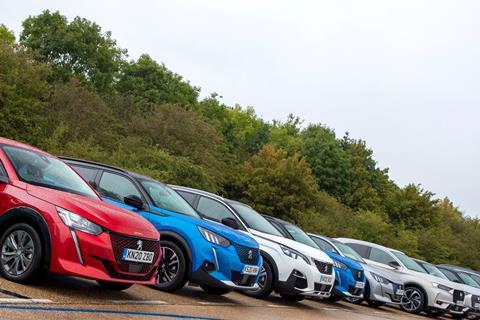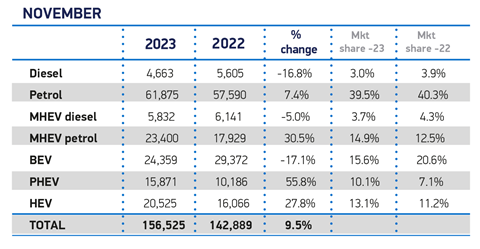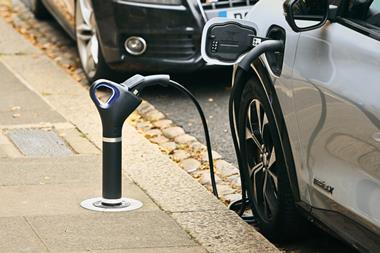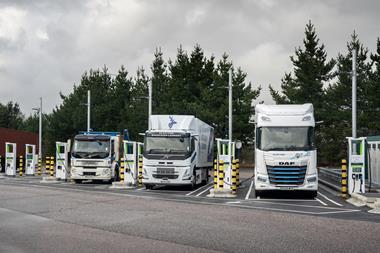
Sales of new battery electric vehicles (BEVs) declined by 17% in November, compared with a bumper month last year, but year-to-date sales are up 27.5%.
The fall in sales led to a reduced market share of 15.6%, however the SMMT reports that last November was a typical with significant deliveries following supply chain disruptions.
Sales of hybrid electric vehicles (HEVs) and plug-in hybrid vehicles (PHEVs), rose by 27.8% and 55.8% respectively in November, with fleets continuing their transition to BEVs, buoyed by tax incentives. Of the 24,359 new BEVs reaching the road in November, 77.4% were taken on by fleets and businesses.
Overall, Society of Motor Manufacturers and Traders (SMMT) figures reveal that new car registrations reached 156,525 in November 2023 – up 9.5% on last November and just -0.1% down on pre-pandemic levels. Growth was driven entirely by fleets investing in the latest vehicles.
Ian Plummer, commercial director at Auto Trader, commented: “November’s drop in EV sales is a sign of what’s to come if the government doesn’t support the industry in making the transition by incentivising consumers on this journey as we know private electric car registrations have been lagging that of the fleet sector for a while now.”
The SMMT agrees that sustained market recovery depends on inspiring consumers with fiscal incentives, as well as greater investment in essential charging infrastructure that gives drivers confidence. It believes halving VAT on new BEVs and reducing VAT on public charging to 5% in line with home charging would increase the attractiveness of driving electric and make the zero emission transition more accessible to a larger number of consumers.
SMMT chief executive Mike Hawes, said: “Britain’s new car market continues to recover, fuelled by fleets investing in the latest and greenest new vehicles. With car makers gearing up to meet their responsibilities under new market legislation, and COP28 currently underway, now is the time to take sensible steps that will multiply that economic growth and minimise carbon emissions. Private EV buyers need incentives in line with those that have so successfully driven business uptake – and workable trade rules that promote rather than penalise the transition.”

Jon Lawes, managing director at Novuna Vehicle Solutions, one of the UK’s largest fleet operators, said: “The £2bn announced in the Autumn Statement to aid zero-emission vehicle manufacturing, combined with the UK’s first-ever battery strategy and a promised consultation on fast-tracking charging infrastructure, have all been encouraging steps for the UK’s EV transition. However, the OBR is still predicting a dramatic fall in EV uptake and with the clock ticking on incoming tariffs, this poses a threat to UK vehicle manufacturing and undermines the commitments in last week’s budget.”
Gav Murray, EV director at British Gas, said: “It remains clear that EVs hold great appeal for UK drivers and businesses, but much work remains to be done before they are accessible to all. According to the UK Electric Fleets Coalition, almost one in three UK households have no access to off-street parking, so ample publicly available charging infrastructure, including kerbside charging, will be essential to make the switch to an EV a reality. This is a key stumbling block not only for private vehicle ownership, but also for commercial fleet managers, who often need employees to be able to charge vehicles off-site and at home. That’s why we, along with a coalition of leading UK businesses, are calling for the government to accelerate its efforts to make EV charging available to everyone who will need it.”
Ken McMeikan, CEO of Moto Hospitality said: “Today’s disappointing EV sales figures clearly show that what the UK needs is a government that is committed in its approach to encouraging and incentivising more people to transition to electric cars. While the figures are a set-back, we are hopeful that if the government acts swiftly on its decision to transform the planning system in favour of delivering low-carbon energy projects and prioritise EV charging hubs then this short term trend will start to reverse.”
He said to to make accelerated progress with EV adoption, it is critical that the government prioritises power to motorway service areas
‘’Moto alone requires 12 times the amount of the power we dispense today, by 2030, and the planning changes are likely to take too long to affect delivery of power over the next two to three years. I am urging the government to accelerate the availability of sufficient power to major travel hubs and to declare the strategic road network as a national priority for power. We stand ready to work with the government during its consultation to inform its plans and ensure they are delivered as quickly and effectively as possible.”
Mark Oakley, director of AA Cars said the free-flowing new car market is powering up used car sales too. “For each driver replacing their current car with a brand new model, another car makes its way onto a second-hand dealer’s forecourt. Many of these models will be nearly-new, offering fantastic value to drivers working within budget constraints.
“With inflation falling sharply and signs that interest rates may have peaked, a gradual easing of the pressure on personal finances should help the new car market continue its growth trajectory into the new year.”































